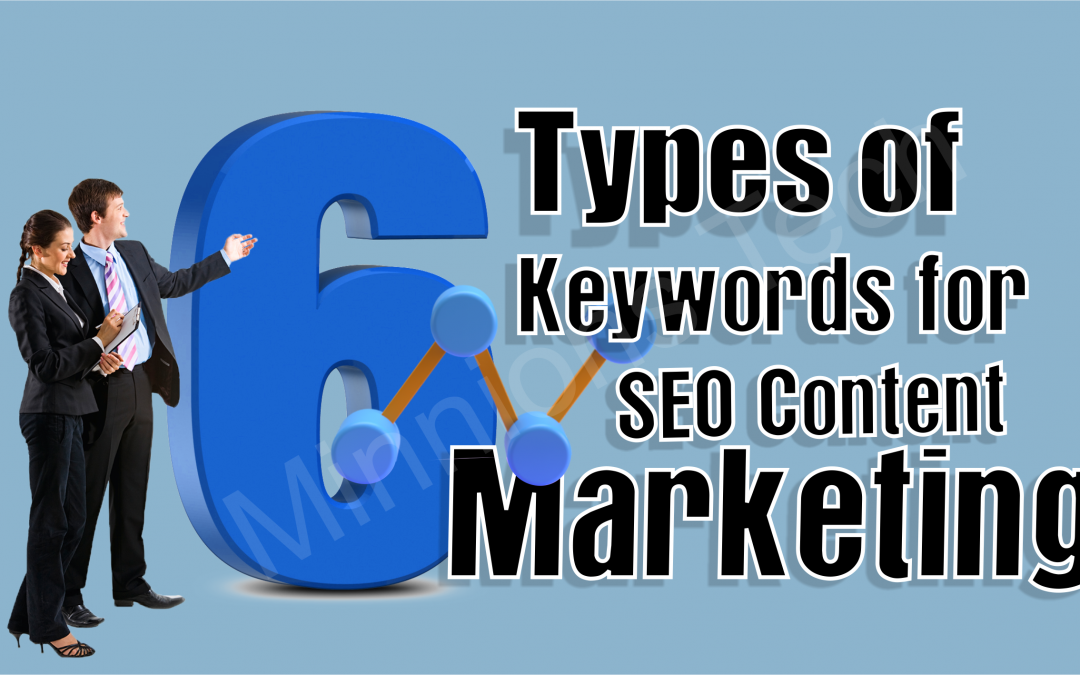SEO and content marketing work hand-in-hand. Discover the best keywords for high-converting rates.
Researching keywords is the critical step for content marketing strategy.
A good keyword strategy is important if you want clients to find you among the billions of websites. Without targeting the right keywords, search engines will take more time indexing content. Search engines easily understand your website when you match your website to any online search keyword.
Below written are six major types of keywords. One may consider while working on a keyword research strategy. It will help you to drive more traffic to your website.
1. Targeting Keywords
These keywords are for those who want to target a specific audience, industry, products, and services. There are six main types of keywords that are mentioned below:
a. Market Segment Keywords
Market segment keywords are generic term that somehow related with your industry. Clients may use these keywords to search for information about the buyer journey they’re in.
For example: A market segment keyword is “shoes”. So, niche keywords like “boots” also came in this field.
b. Customer-Defining Keywords
These are search terms used by customers who are looking for more specific products. This includes items like, ”women’s Shirts”.
c. Branded Keywords
Brand keywords refer to a specific brand of products, like ‘Denim Women’s Jeans’. These types of keywords engage more buyers.
d. Product Keywords
As the name reflects, product keywords are for specific products.
For example, ‘Denim Women’s Jeans’. The best use of this keyword is to directly reach on product pages. Where the buy now option will do the rest of the work.
e. Competitor Keywords
It makes sense to go with what’s working in your industry. A little research can reveal which keywords and keyword combinations work for your competition.
You can switch your brand name with competitors so you can take benefit of all keywords for your means.
For Example ‘Denim Women’s Jeans’ vs ‘Your brand Women’s Jeans’.
f. Geo-Targeted Keywords
It is Location-based keywords that drag your town and city. It helps the user to reach the nearby store for purchase.
For example ‘Women’s Jeans in Bangalore’, or ‘Bangalore clothing store’.
Google’s currently emphasis on local search. So, that geo-targeted keywords are an effective way to reach your customers easily.
To know more about SEO or content marketing reach en.wikipedia.org
2. Keyword Research According to Length
These keywords are best-known for search engine optimization. There are three types of length keywords:
a. Short-tail keywords only have one or two target words like, ‘dog food’ have very high search results. These keywords are difficult to rank because many organizations are advertising these items.
b. Medium-tail keywords is somehow easier to rank for more specific products. Keywords like ‘plus size clothes’ are medium tail keywords.
c. Long-tail keywords are the easiest to rank, like ‘cloths for plus size women’s western wear’. Unfortunately, these keywords have fewer search results. They have high conversion rates, but the searches are low.
3. On-Site Keywords
On-site SEO is the top SEO content marketing strategy for attracting more visitors. This usually includes one primary keyword and various relatable secondary keywords.
These keywords are specially chosen for a specific blog or webpage. Each page needs to have one primary keyword, as well as the secondary keywords sprinkled around the blog.
For example: if you choose a primary keyword like, ‘premium perfume’, the secondary keywords would be, ‘premium perfume reviews’ or ‘best premium perfume’.
4. Types of Keywords for Google Ads in Your Keyword Research
Paid advertising from Google brings a new strategy into indexing. When you use search engine marketing, you’ll have to bid on some specific keywords. According to a special plan that is as follows:
a. Broad Match Keywords
A broad match keyword system, Google shows your ad when a user types a specific keyword as well as any other related word to it. This includes misspellings, singular/plural forms, synonyms, and terms close to it.
b. Phrase Match Keywords
When someone targets a key phrase, like ‘men’s shirt’, Google shows your ad if any search has that exact key phrases.
For example, ‘men’s shirts for summer’, ‘men’s shirts plus-size’, or ‘designer men’s shirt.
c. Exact Match Keywords
In this, Google will show your ads only for similar keywords or phrase. These include closely related words, combinations, paraphrases, and misspellings if they have the same search rate.
For example: The keyword ‘men’s shirts’ would also count for terms like ‘shirts men’, or ‘shirts for men’.
d. Negative Keywords
Negative keywords are terms with a similar meaning but different user searches. If you put these negative keywords in Google ads, your page may not appear for their pointless terms.
For example: ‘men’s winter shirts’ would be ‘men’s summer shirts’.
5. Buyer Keywords in Your Keyword Research
People who take online products or services use buyer keywords to search their needs. These keywords have three different categories. Each one represents different search results.
a. Informational keywords set in the exploring stage of the purchaser journey. Usually, these keywords include terms like ‘why’, ‘how’ ‘what’.
b. Navigational keywords are for those who are searching for information of a products. Users search the term ‘best’ as well as a specific brand.
c. Transactional keywords are for those customers who are ready to make a purchase. ‘Best deals’ and ‘free delivery’ are included in their searches.
6. Short-Term Fresh Keywords
Did anyone say ‘Corona virus’? The most searched word in the history of the internet. It displays how selecting something typical can easily increase rankings.
What’s more, these keywords only work on timely blog posting.
Partner with Us to Get on Top of Keyword Research
Keyword research is crucial for SEO content marketing. It takes extra time to find the best keyword for your products / services.
Contact MINNIONS TECH today and we’ll do all the hard work needed to find those perfect keywords for your business.



